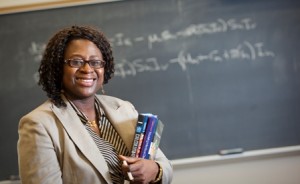
Miranda Teboh-Ewungkem, assistant professor of mathematics
Miranda Teboh-Ewungkem, assistant professor of mathematics, still remembers the hot ache in her bones and exploding chills from one of the worst cases of malaria she ever contracted. A first-year student at the University of Buea in Cameroon in 1993, she could barely move, transfixed at times by the bright dreams of delirium.
The goal at the time was to survive, she recalls, but ultimately the experience would provide inspiration for a master’s thesis that so far has defined her life’s work.
One of seven children, Teboh-Ewungkem grew up in Cameroon, a relatively stable country in West Africa, bordered by Nigeria and Chad. Her parents had encouraged her to become a doctor so she enrolled in a biology class as an undergraduate, but she got bored after one month and switched to math.
“I knew it was what I wanted to do,” says Teboh-Ewungkem, who graduated first in her class and then stayed on to pursue a master’s degree. When it came time to choose a research topic, she remembered her feverish dance with malaria and decided to use math to examine a mosquito’s transmission of the disease-carrying parasite from one person to another.
Her research was hailed as “breakthrough” by Cameroon’s epidemiology community.
“It really helped raise awareness” about the use of mathematical biology in controlling malaria, she says.
For Teboh-Ewungkem, the subject matter is not only personal but pervasive, especially in African countries where more than a million people die of malaria each year and 20 percent of them are children. The situation has become more complicated over the last few years as the parasites are growing resistant to the world’s most powerful drugs.
There is no vaccine for malaria and treatment usually consists of taking pills three times a day for three days. However, some people don’t complete the cycle, which can lead to the development of resistant strains.
“I like the idea of using math to inform the health care professional,” says Teboh-Ewungkem.
After earning a master’s in pure mathematics at the University of Buea, she moved to the United States and received both a master’s degree in statistics and a Ph.D. in applied mathematics from Lehigh University, where she studied the transport of oxygen to tissues.
She joined the Lafayette faculty in 2004 and decided to revisit her malaria research. If successful, it could aid vaccine developers in reducing occurrences and help public policy makers create more effective strategies to control the disease by considering breeding sites and the population ratios of mosquitoes to humans.
“It’s become my cause,” says Teboh-Ewungkem, who played handball and soccer in college and has a blue belt in karate.
In 2009, she used a National Science Foundation grant to organize an international workshop and conference at the University of Buea for faculty from colleges and universities in Africa, the U.S., and Europe to share ideas for the use of math to study some of the world’s most troubling health problems, such as malaria and AIDS.
She also gave the keynote lecture at the Southern Africa Mathematical Sciences Association (SAMSA) conference in Gaborne, Botswana, in November. Titled “A New Way to Model the Dynamics of Malaria Transmission Showing Natural Occurring Oscillations,” her presentation was attended by government officials and the head of the University of Botswana.
Teboh-Ewungkem sees math in everything from the creation of colorful African cloth to the calculated moves of karate. “We are surrounded by mathematics,” she says. “We just need to look hard to find it, and mathematical biology makes that possible by connecting two different disciplines.”
It’s a philosophy she enjoys sharing, especially in the classroom.
“I don’t think I’ve found a more respectful group of students than at Lafayette,” she says. “They have a real love for learning.”
Teboh-Ewungkem teaches Calculus III, Applied Statistics, Probability, and Mathematical Biology and understands that not everyone catches on to difficult concepts as she does. That’s why she assesses her students’ mathematical maturity and strength at the start of each semester and conducts classes accordingly.
“I try to find ways to reach all students,” she says. “I don’t think I’m satisfied with a student who has a puzzled look. I always want them to excel. I love imparting knowledge.”

1 Comment
Comments are closed.